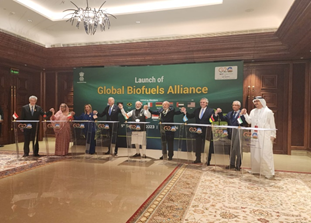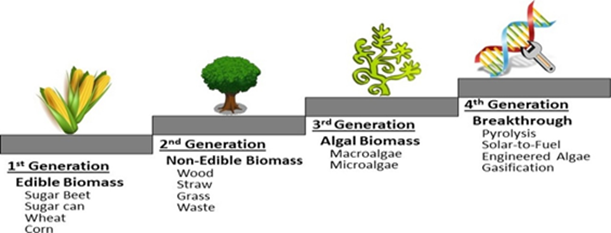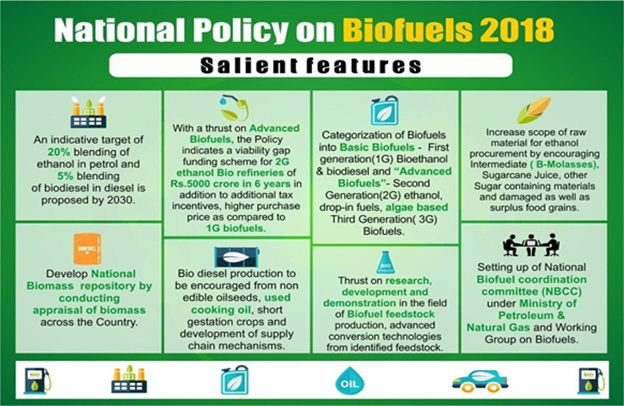

11th September 2023 (10 Topics)
Context
The Global Biofuels Alliance (GBA) has been announced by India on the sidelines of the G20 Summit.
About Global Biofuel Alliance (GBA):
- GBA is an India-led Initiative to develop an alliance of Governments, International organizations and Industry to facilitate adoption of biofuels.
- Objective: Bringing together the biggest consumers and producers of biofuels to drive biofuels development and deployment, the initiative aims to position biofuels as a key to energy transition and contribute to jobs and economic growth.
- Joining Members: 19 countries and 12 international organisations have already agreed to join.
- G20 countries (07) supporting GBA: Argentina, Brazil, Canada, India, Italy, South Africa, USA
- G20 Invitee Countries (04) supporting GBA: Bangladesh, Singapore, Mauritius, UAE
- Non G20 (08) supporting GBA: Iceland, Kenya, Guyana, Paraguay, Seychelles, Sri Lanka, and Uganda have agreed to be initiating members of GBA, and Finland.
- International organizations: World Bank, Asian Development Bank, World Economic Forum, World LPG Organization, UN Energy for All, UNIDO, Biofutures Platform, International Civil Aviation Organization, International Energy Agency, International Energy Forum, International Renewable Energy Agency, World Biogas Association.
- Significance:
- GBA Members constitute major producers and consumers of biofuels.
- USA (52%), Brazil (30%) and India (3%), contribute about 85% share in production and about 81% in consumption of ethanol.
- Functions:
- GBA will support worldwide development and deployment of sustainable biofuels by offering capacity-building exercises across the value chain, technical support for national programs and promoting policy lessons-sharing.
- It will facilitate mobilizing a virtual marketplace to assist industries, countries, ecosystem players and key stakeholders in mapping demand and supply, as well as connecting technology providers to end users.
- It will also facilitate development, adoption and implementation of internationally recognized standards, codes, sustainability principles and regulations to incentivize biofuels adoption and trade.
India’s Approach:
- The alliance will focus on collaboration and will provide additional opportunities to Indian industries in the form of exporting technology and exporting equipment.
- It will help accelerate India’s existing biofuels programs such as PM-JIVANYojna, SATAT, and GOBARdhan scheme, thereby contributing to increased farmers’ income, creating jobs and overall development of the Indian ecosystem.
What are Biofuels?
- Biofuels are liquid fuels produced from renewable biological sources, including plants and algae.
- Biofuels offer a solution to one of the challenges of solar, wind, and other alternative energy sources.

Advantages of Biofuels
- Availability: since biofuels only require biomass for their production, which is ubiquitous, biofuels are easy to produce.
- Reduction in waste: biofuels can also be produced using waste materials such as municipal sewage waste, inedible parts of the crops. This effectively aids in the reduction of waste.
- Reduce dependency on crude oil and non-renewable sources of fuels.
- Economic development: the production of biofuels can be a labour-intensive process thus resulting in the creation of jobs. This can provide a source of employment. It can aid in the development of rural areas when the second generation biofuel production units are set up there.
Disadvantages of Biofuels
- Low Efficiency: The efficiency of biofuels is much lesser compared to fossil fuels, as fossil fuels produce more energy on burning.
- Loss of biodiversity: the genetically modified crops used for the production of fourth-generation biofuels could result in a loss of biodiversity.
- Less availability of space: production of biofuels requires land, and in the case of second-generation biofuels, the crops used are mostly non-food crops, thus the production of biofuels requires a lot of space.
- Food shortage: The first generation biofuels make use of food sources and there is an imminent threat of facing food shortage if the production of biofuels is carried out extensively.
- Water usage: Massive quantities of water are required for proper irrigation of biofuel crops as well as to manufacture the fuel, which could strain local and regional water resources. This is, however, not the problem in case of the third generation biofuel.
National Biofuel Policy
- The policy is aimed at taking forward the indicative target of achieving 20% blending of biofuels with fossil-based fuels by 2030.
- The policy intends to ensure the adequate and sustained availability of domestic feedstock for biofuel production, increasing farmers’ income, import reduction, employment generation and waste to wealth creation.
- This policy clearly exhibits the Centre’s push towards strengthening the energy infrastructure of the country while promoting the agenda of sustainability.

More Articles


